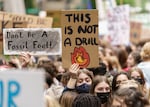Student activism around climate change has been ramping up in recent years, with students across Oregon and the country leading walkouts and protests.
Students see climate change discussions on social media and they talk about it with their friends.
“For our generation, this is something that everyone is talking about, because we understand how pressing this issue is,” said Bend Senior High School junior Olive Nye. “And it really feels like an emergency to us.”
Students see and experience the effects of climate change firsthand in places like the Klamath Basin. Klamath Union High School rising senior Kate Rodriguez grew up in Klamath and feels connected to the outdoors and nature there.
Seeing the increase in significant environmental problems in her backyard pushed her to get involved in climate organizations.
“The more that I see wildfires and drought, I wanted to do something even if it wasn’t related to my school,” Rodriguez said.
Nye and Rodriguez are part of a statewide group of students and teachers pushing for more education on climate and sustainability, including place-based lessons schools can tailor to a community’s specific issues. The group, Oregon Educators for Climate Education, includes teachers from across the state.
“In Oregon, every single region and even micro-region has different issues they’re facing,” said group member and University of Oregon professor Sarah Stapleton.
But for all the activism and real-life impacts of climate change, conversations about the issue can be pretty limited in the classroom.

(Left to right) Maya Malka, 17, JJ Klein-Wolf, 15, and Dana Savage, 15, lead thousands of area youth climate activists and supporters on a march through downtown Portland, May 20, 2022, as part of a youth-led climate mobilization demanding city leaders take meaningful action on climate change.
Kristyna Wentz-Graff / OPB
“For the majority of my high school, middle school experience, the majority of my climate education has been in only science classes,” said recent graduate of South Eugene High School, Bodhi Coelho.
Coelho also mentioned his Spanish class.
“I’m lucky to have a teacher who’s very aware about sustainability, so she’ll educate us on topics about sustainability from time to time,” he added.
But not every student has that experience. This group of students and teachers is trying to change that, with a grassroots effort to create a statewide climate curriculum in Oregon, with students learning about the changing climate and sustainability across all grades and subjects.
New Jersey has done something similar, updating the state’s learning standards in 2020 to include climate change, “leveraging the passion students have shown for this critical issue,” as that state’s education department put it.
And in Oregon, creating new standards out of legislation isn’t a new idea.
Oregon Educators for Climate Education has drafted legislation that outlines objectives for students to learn about climate and sustainability in their core classes, including math, language arts and social studies.
And they’re gaining traction. Earlier this year, the legislation received the support of the Oregon Education Association during its Representative Assembly, with OEA saying it will support the legislation, and offering a chance to work with the union’s lobbying team.
This week, 20 educators from across Oregon have been meeting for what social studies specialist Jenoge Khatter calls a “summer curriculum camp” to develop place-based lessons and provide examples for legislators of sample lessons. The group received grant funding to host the event.
“That’s what we’re going to be engaging in, trying to get elementary educators, middle school, high school, in different subject areas … to develop these things,” said Khatter, an educator in the Eugene School District.
When it comes to climate education, students say they want more than a mention in science class or electives that aren’t available to everyone.
Class offerings, activities vary by school
Oregon’s science standards, updated in 2014, mention the environmental impacts of humans and global climate change, but Oregon students recall few lessons, or mentions — and say they mostly start in high school.
“It’s kind of like something that some teachers try and talk about, but at the same time, it almost feels like, from a student’s perspective, it almost feels a little controversial in a way for some faculty to talk about,” said Lottie Rodhe, a junior at Churchill High School in Eugene.
" … Right now, it’s more of an optional thing to talk about.”
Other students describe in-depth environmental courses as only being offered to advanced students, or as an elective.
Some schools have sustainability programs, led by students or staff. But organizers say they’re limited by gaps in student knowledge and a lack of structured support.
Niels Pasternak is a special education and life skills teacher at South Eugene High School.
A school recycling program he led with students became an educational one, connecting with other teachers to help students learn about food waste and the environmental impacts associated with food.
Pasternak said the legislation could support more collaboration.
“If that gets completed and passed, that’s going to open up the door for more and more cross-disciplinary connections and partnerships,” Pasternak said.
Darin Henry helped organize a large recycling program at Sheldon High School, also in Eugene. The now-retired educator said students didn’t know how to recycle properly or know about broader environmental issues.
“We couldn’t save Sheldon High School, we couldn’t recycle for them,” Henry said. “It came down to, the students need to also know about how our economics are also affecting climate, and how our history is not telling the story of our climate … and it’s a global issue.”
Educators have been leading their own sustainability efforts in the Portland metro area, as well.
Breck Foster teaches social studies and Spanish at Lake Oswego High School and works with students in the school’s green team.
“The movement that started with this group that was going on in Eugene, we sort of had this parallel but different movement going on in Lake Oswego,” Foster said, noting similar efforts in Portland and eastern Oregon.
“There are all of these sorts of things happening, but the goal of this program … is really to help kind of connect all of these pieces.”
Teachers and students have taken on their own efforts beyond the classroom to get involved in environmental issues.

One of thousands of young people who marched through downtown Portland, May 20, 2022, holds a sign, as part of a youth-led climate mobilization.
Kristyna Wentz-Graff / OPB
Several students involved in the student advisory group for Oregon Educators for Climate Education are also a part of Our Future, a larger statewide network of students focused on climate change.
For Lincoln High School senior Amy Henrikson, a recent environmental justice class led her to outside organizations, including Our Future and the Portland Youth Climate Council.
Her Lincoln High School classmate Erika Leung’s “environmental justice journey” has changed over the years — from taking individual sustainability actions as a kid, to working to find solutions and joining outside organizations. But Leung wishes she received more climate education in the classroom.
“I really wish that curriculum supported me as I got more nuanced understanding of the climate issue as I got into high school,” Leung said.
A model for statewide curriculum
Eugene’s students have established a national reputation as they’ve advocated over climate change for years, most notably with a student-led court case that started in Oregon in 2015. Teachers there started to realize students needed more — and a law was the best way to do that.
In 2020, a group of Eugene educators held a climate change curriculum summit at Sheldon High School. After the summit, they continued to hear from students and teachers who wanted more robust climate education, and more support in teaching about climate.
“For many of us, we’ve seen our students be part of many efforts that have been a part of national efforts for quite a while,” Khatter said.
That summit motivated Eugene teacher Tana Shepard and others to find ways to teach about climate change in an appropriate way, especially for younger students.
“How can we help our colleagues have a better understanding of how to deliver this important content in a more hopeful, solutions-oriented [way], instead of, ‘oh my gosh, you only have 8 years to live!” Shepard said.

Thousands of area youth climate activists and supporters marched through downtown Portland, May 20, 2022, as part of a youth-led climate mobilization demanding city leaders take meaningful action on climate change.
Kristyna Wentz-Graff / OPB
So the group of educators created draft legislation, using the model of past legislative efforts to require teaching the history of Oregon’s tribes and lessons on the Holocaust and genocide.
“We looked at those guiding documents and began to work on our own piece of legislation,” Khatter said.
The bill requires instruction on historic and current Indigenous ways of living, the impact of garbage and emissions on communities and ecosystems, and the disproportionate impact of climate change on diverse groups within Oregon, the U.S., and around the world.
With this legislation, “A big goal is for students to see how interconnected they are with everything,” Khatter said. He wanted to fight what he calls “blinders” and “hopeless” feelings students can have, and instead “feel empowered.”
Seeking climate solutions, not climate doom
Teacher Tana Shepard wants to see adults work alongside students.
“It’s our responsibility as adults to not just be like, ‘ok, good luck with that you guys, we’re out,’” Shepard said.
“It’s on us, and it behooves us to help dig in and navigate and educate and roll our sleeves up.”
Shepard says climate education should inspire students to find solutions while also acknowledging the urgency of the issue.

"This is not a drill," reads one of the many signs held by young people who marched through downtown Portland, May 20, 2022, demanding city leaders take action on climate change.
Kristyna Wentz-Graff / OPB
Recent graduate Bodhi Coelho says climate education should be treated like an emergency drill.
“These very momentary safety drills … we don’t debate about this, we don’t like there’s no discussion like this is what we do and we do it because we want to stay alive and be safe,” Coelho said.
“I feel like climate education should be something that is at that level.”
But starting conversations about climate change can be overwhelming, or sad. Junior Lottie Rodhe said it can be a “draining subject.”
“It has this stigma of doom and depression that go along with it,” she said. “And we’re already dealing with so much as teenagers.”
Rodhe says she didn’t talk much about the issue at home growing up, due to political divides among family members.
“[That’s] another reason why I think it’s so important that we need to talk about it at school, because there are so many people and so many families that don’t talk about it.”
Recent Sheldon High School graduate Olivia Plumb agrees that climate education has the potential to build community — and hope — around a difficult issue.
“If climate education is more widely implemented, more people will find that support and then feel less helpless, and then more empowered about that,” Plumb said.
That includes educating the state’s youngest learners.
Henrikson, Leung, and classmate Chloe Gilmore have taken it upon themselves to visit local elementary schools as part of a club to talk about climate change and environmental justice.
“When people know about not only the impacts and the urgency of the situation, but also when they learn about how to move forward towards solutions and work as a community, I think that is what fosters this mindset that climate solutions are possible,” Gilmore said.
“And if we act now then we can actually help mitigate the impacts.”
